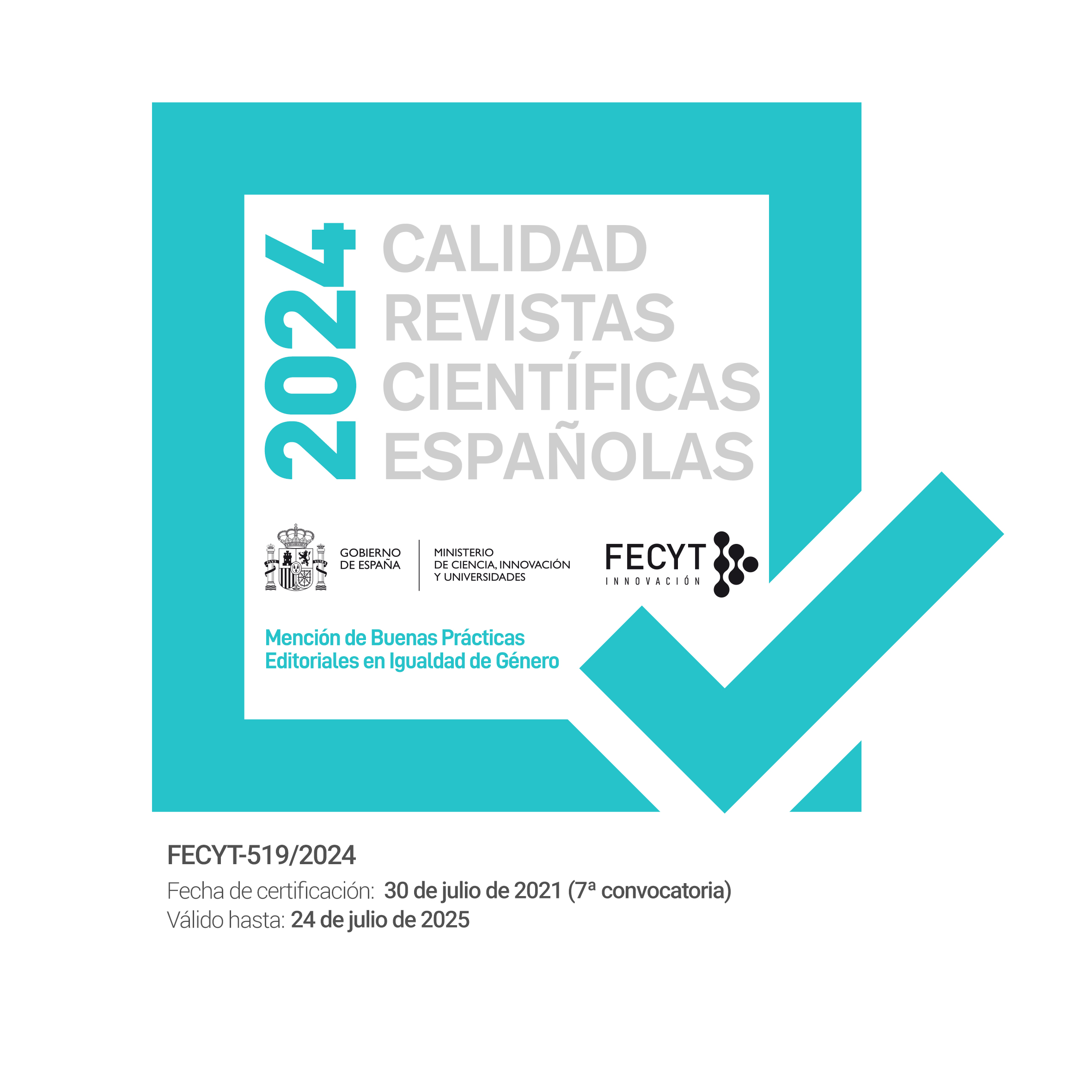Introduction to the Special Issue ‘Diachronic English for Specific Purposes
Palabras clave:
languages for specific purposes, linguistics, applied linguistics, specialised discourse, discourse studies, pragmatics, historical pragmatics, historical linguisticsResumen
Historical linguistics has been in constant rebirth and innovation to conform to new advances in the way texts are methodologically addressed. These methods of study have given way to several interdisciplinary focuses, which include the disciplines of historical sociolinguistics (Milroy, 1991; Conde-Silvestre, 2007), historical pragmatics (Jucker, 1995) or diachronic pragmatics (Arnovick, 1999), historical discourse analysis (Brinton, 2001; Berkenkotter, 2009; Navarro, 2008), and historical sociopragmatics (Culpeper, 2009). In this context, we have to mention the groundbreaking work on dialogue analysis by Jucker, Fritz and Lebsanft (1999), and the volume on historical speech acts by Jucker and Taavitsainen (2008). These two books represented an advance in the way both written and spoken discourse should be addressed at from a historical dimension. Historical pragmatics has proven to be the most fruitful discipline of all and, since the foundation of the Journal of Historical Pragmatics by Jucker in 2000 (John Benjamins), it seems to be constantly increasing.
Descargas
Citas
Archer, D. (2006). (Re)Initiating strategies: Judges and defendants in Early Modern English courtrooms. Journal of Historical Pragmatics 7.2, Special Issue on Historical Courtroom Discourse, edited by Barbara Kryk-Kastovsky, 181-211.
Arnovick, L. (1999). Diachronic Pragmatics. Seven case studies in English illocutionary development. Amsterdam: John Benjamins.
Atkinson, D. (1992). The evolution of medical research writing from 1735 to 1985: The case of the Edinburgh Medical Journal. Applied Linguistics 13.4, 337-374.
Becker, M. (2002). “Yf ye wyll bergayne wullen cloth or othir marchandise...: Bargaining in Early Modern Language Teaching textbooks. Journal of Historical Pragmatics 3.2, 273-297.
Berkenkotter, C. (2009). A case for historical “wide-angle” genre analysis: A personal retrospective. Ibérica 18, 9-22.
Brinton, L. J. (2001). “Historical discourse analysis”. In D. Schiffrin, D. Tannen & H. E. Hamilton (Eds.), The handbook of Discourse Analysis (pp. 138-160). Malden, Massachusetts/Oxford: Blackwell.
Carroll, R., R. Hiltunen, M. Peikola, J. Skaffari, S. Tanskanen, E. Valle & B. Wårvik. (2003). Introduction. In R. Carroll et al. (Eds.), Discourse perspectives on English: Medieval to modern (pp. 1–12). Amsterdam/Philadelphia: John Benjamins.
Conde Silvestre, J. C. (2007). Sociolingüística histórica. Madrid: Gredos. Culpeper, J. (2009) Historical sociopragmatics. An introduction. Journal of Historical Pragmatics 10.2, 179-186.
EMEMT: Early Modern English Medical Texts. (2010). CD-ROM with EMEMT Presenter software. I. Taavitsainen, P. Pahta, T. Hiltunen, M. Mäkinen, V. Marttila, M. Ratia, C. Suhr & J. Tyrkkö (compilers). Published together with I. Taavitsainen & P. Pahta (Eds.), Early Modern English medical texts: Corpus description and studies. Amsterdam & Philadelphia, PA: John Benjamins.
Jacobs, A., & A. H. Jucker. (1995). The historical perspective in pragmatics. In Andreas H. Jucker (Ed.), Historical pragmatics. Pragmatic developments in the History of English. (Pragmatics & Beyond New Series 35). Amsterdam/Philadelphia: John Benjamins, 3-33.
Jucker, A. H., & I. Taavitsainen (Eds.). (2008). Speech acts in the History of English. (Pragmatics & Beyond New Series 176). Amsterdam/Philadelphia: John Benjamins.
Jucker, A. H., Gerd Fritz, & Franz Lebsanft (Eds.). (1999). Historical dialogue analysis. (Pragmatics & Beyond New Series 66). Amsterdam/Philadelphia: John Benjamins.
Jucker, Andreas H. (ed.). (1995). Historical pragmatics. Pragmatic developments in the History of English. (Pragmatics & Beyond New Series 35). Amsterdam/ Philadelphia: John Benjamins.
Li, J. & G. Ge (2009). Genre analysis: Structural and linguistic evolution of the English-medium medical research article (1985-2004). English for Specific Purposes 28.2, 93-104.
MEMT: Middle English Medical Texts. (2005). CD-ROM with MEMT Presenter software. I. Taavitsainen, P. Pahta & M. Mäkinen (compilers). Amsterdam & Philadelphia, PA: John Benjamins.
Milroy, J. (1991). Linguistic variation and change: on the historical sociolinguistics of English. Oxford: Blackwell.
Navarro, F. (2008). Análisis histórico del discurso. Hacia un enfoque histórico- discursivo en el estudio diacrónico de la lengua. In Moreno-Sandoval, A. (ed.), Actas del VIII Congreso de Lingüística General. http://www.lllf.uam.es/clg8/actas- paperCLG85.pdf. Retrieved online 15 may, 2011.
Peikola, M., & J. Skaffari. (2005). A frame for windows. On studying texts and discourses of the past. In J. Skaffari, M. Peikola, R. Carroll, R. Hiltunen and Brita Warvik (Eds.), Opening windows on texts and discourses of the past. Pragmatic and beyond new series (pp. 1-4). Amsterdam: John Benjamins.
Salager-Meyer, F. (1998). Referential behaviour in scientific writing: A diachronic study. English for Specific Purposes 18.3, 279-305.
Salager-Meyer, F. & G. Defives (1998). From the gentleman’s courtesy to the scientist’s caution: a diachronic study of hedges in academic writing (1810-1995). In I. Fortanet y S. Posteguillo (Eds.), Genre studies in English for Academic Purposes (pp. 133-171). Castellón: Publicaciones de la Universitat Jaume I.
Taavitsainen, I., & S. Fitzmaurice (2007). Historical pragmatics: What it is and how to do it. In Susan M. Fitzmaurice and Irma Taavitsainen (Eds.), Methodological issues in historical pragmatics (pp. 11-36). Berlin: Mouton de Gruyter.
Descargas
Publicado
Cómo citar
Número
Sección
Licencia
Aquellos autores/as que tengan publicaciones con esta revista, aceptan los términos siguientes:
- Los autores/as conservarán sus derechos de autor y garantizarán a la revista el derecho de primera publicación de su obra, el cuál estará simultáneamente sujeto a la Licencia de reconocimiento de Creative Commons que permite a terceros compartir la obra siempre que se indique su autor y su primera publicación esta revista.
- Los autores/as podrán adoptar otros acuerdos de licencia no exclusiva de distribución de la versión de la obra publicada (p. ej.: depositarla en un archivo telemático institucional o publicarla en un volumen monográfico) siempre que se indique la publicación inicial en esta revista.
- Se permite y recomienda a los autores/as difundir su obra a través de Internet (p. ej.: en archivos telemáticos institucionales o en su página web) antes y durante el proceso de envío, lo cual puede producir intercambios interesantes y aumentar las citas de la obra publicada. (Véase El efecto del acceso abierto).

Revista de Lenguas para fines específicos is licensed under a Creative Commons Reconocimiento-NoComercial-SinObraDerivada 4.0 Internacional License.























